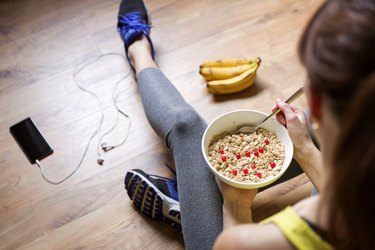
If you feel a pain in your chest when swallowing food or drink, you're not alone. Most people will experience this discomfort occasionally, along with a feeling that it hurts to burp. But if these become regular issues, a visit to the doctor can help you nail down the exact cause, and the best treatment.
Chest Pain Connection
Video of the Day
Sudden chest pain is obviously something many of us fear. But if it hurts to burp after eating, or if you feel a pain in chest when swallowing food or drink, there are a few potential explanations, ranging from the mildly irritating to the serious.
Video of the Day
- Heartburn: While some people may be prone to chronic heartburn, for others it's only an occasional irritant. Heartburn, or acid reflux, happens when stomach acids from eating or drinking rise up into your esophagus. When it hurts to burp — and if the act of belching helps the pain go away — that's often the sign of common heartburn, according to the American Heart Association (AHA).
- GERD: Gastroesophageal reflux disease (GERD) is similar to heartburn, but it happens more regularly. Mayo Clinic notes that if you experience "heartburn" at least twice a week, you likely have GERD. The same is true if the pain is severe, at least once a week.
- Gallstones: If gallstones have formed in your gallbladder or intestine, your gall bladder responds by pumping out bile to surround them. Harvard Health Publishing (HHP) notes that one side effect of this protective function is that you may feel pain just under your breastbone, either isolated or radiating out to your back or right arm.
- Esophageal spasm: This type of "squeezing" chest pain can come on quickly, but last as long as a few hours. Some people experience it regularly, while for others it's an occasional nuisance, according to HHP. You may also have trouble swallowing your beverage, or feel like something is stuck in your throat. Many people who have this problem also find that food or drink comes back up into their mouths.
- Achalasia: While some digestive issues occur after the food has reached the stomach, achalasia is a swallowing problem that prevents some food from moving from the esophagus into the stomach. Chest pain is one possible symptom, as is weight loss. Because achalasia interferes with your ability to process food, the condition can become serious.
Read more: Why Do I Burp After Exercise?
Warning
Chest pain when drinking water and other beverages, eating food or burping, is usually not a cause for panic. However, if you also feel lightheaded, extremely fatigued, or break into a cold sweat, there’s a chance you may be having a cardiac event. Even if you’re not sure whether to rule out heartburn or esophagus issues, it’s better to be safe rather than sorry. Seek medical attention right away.
Managing Your Pain
If problems like muscle spasms or stomach acid issues become chronic, your doctor may suggest medication or surgery. A problem such achalasia will likely require surgery or a procedure known as balloon dilation. Often, however, lifestyle changes can help control pain in chest when swallowing food or drink.
To decrease your incidences of heartburn, try cutting back on coffee, orange juice and late-night snacks, advises the AHA. Sleeping with your bed raised up at the end, or propping your head and chest on several pillows, may help keep the acids from rising after bedtime.
The Cleveland Clinic suggests additional things to avoid for various types of esophageal disorders. These include chocolate, fatty ingredients, fried foods, spicy meals and alcohol.
Read more: Why High-Fat, Greasy Foods Might Worsen Indigestion
While eating smaller meals throughout the day is often recommended for general health benefits, for people with pain after eating, it's better to have a fuller stomach, according to the Cleveland Clinic. In addition, napping or going to bed within 3 hours after eating should be avoided.
To lower instances of esophageal spasm, only consume drinks at a moderate temperature, and avoid red wine. Peppermint lozenges may also relax the esophagus muscles, notes the Mayo Clinic.
- American Heart Association: "Heartburn or Heart Attack?"
- Mayo Clinic: "GERD"
- Harvard Health Publishing: "Other Conditions May Be Causes of Chest Pain"
- Cleveland Clinic: "Achalasia Overview"
- Mayo Clinic: "When to Worry"
- Cleveland Clinic: "Lifestyle Changes Regarding Swallowing Disorders"
- Mayo Clinic: "Esophageal Spasms Home Remedies"
Was this article helpful?
150 Characters Max
0/150
Thank you for sharing!
Thank you for your feedback!